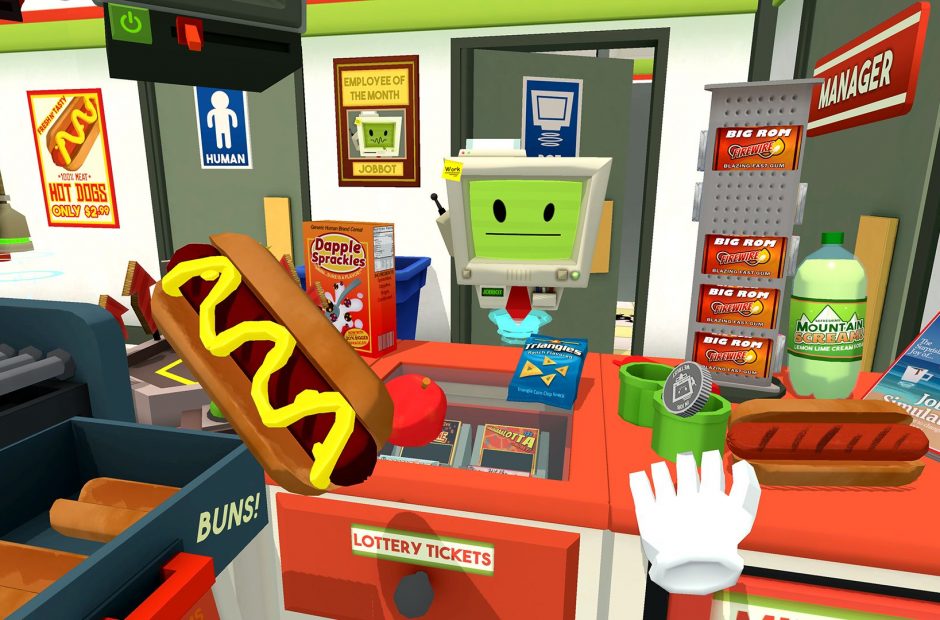
What’s the secret to VR development? In truth, no one knows medium is far too young for any hard-and-fast rules to be universally applicable. If any studio comes close to answering the question, however, it’s Austin-based Owlchemy Labs, the VR pioneers behind Job Simulator, Rick and Morty, and the upcoming Vacation Simulator.
Job Simulator won last year’s GDC Choice Award for best VR/AR title, so influential that search giant Google Owlchemy outright about nine months ago. At the recent DICE Summit in Las Vegas, Owlchemy head Alex Schwartz offered advice to a crowd of developers, urging them to forget the paradigms of traditional game design when working in VR. Moreover, he stressed that hand presence and accurate tracking of a player’s hand motions are one of the keys to making a VR world feel convincing. It was certainly successful for Job Simulator, which enables players to use their hands to perform numerous real-world tasks. s of last year, had earned more than $3 million a veritable fortune in the VR ecosystem, considering its meager installed base.
The success that Owlchemy has enjoyed isn’t some happy accident. Building immersive VR worlds takes a unique awareness of environmental interactions. Schwartz calls himself “Chief Executive Owl,” which perhaps is apt given that owls are one of the few birds to have forward-facing, stereoscopic vision for enhanced depth perception, and their hearing is equally acute.
“It just comes [down] to player behavior and watching what doesn’t work when someone tries to overload the brain with too many buttons or too many abstractions,” Schwartz explains to me at DICE. “You see people get frustrated and you go, ‘Oh, you know what, maybe we should simplify this interaction to be more simple or we should not require the user to have to remember what button to hit.’ It’s essentially like you’re A/B testing your way to the best product, but every choice, you won’t necessarily know what might be good until someone that’s not on your dev team tries it and has either a smooth experience or kind of pauses for a second.”
Historically, play testing has always been a big part of fine-tuning gameplay throughout the course of development, but never has its importance been greater than in the field of VR where even the smallest glitch can take someone out of the experience or, worse yet, induce motion sickness.
You can’t only bring in 5’9 white dudes, right? It has to be a diverse group of people with all backgrounds and people of all shapes, sizes, and worldviews, which is really difficult. But that’s on us now as game developers.
“Play testing has become way more important than just QA for the game and making sure it doesn’t crash,” Schwartz continues. “Have we done the right thing psychologically for what the player expects and wants and needs? So that means play testing is our top priority. If we try something and it works for one or two people in the office, does that mean it’ll work for everyone of every background out there? So that means we have new people coming in and trying things all the time.”
During his keynote speech at DICE, Xbox boss Phil Spencer championed the role that diversity and inclusivity will play in the future of interactive entertainment. Spencer’s message is one that can be applied to many facets of game development, including play testing.
“You can’t only bring in 5’9 white dudes, right? It has to be a diverse group of people with all backgrounds and people of all shapes, sizes, and worldviews, which is really difficult,” Schwartz notes. “But that’s on us now as game developers. You don’t usually think, ‘Oh, game developers, they’re leading the forefront of human interaction. It’s like, no actually, a lot of this is on us to figure out.”

Game developers are leading the way when it comes to VR, and if you believe that VR/AR is the future of human-computer interfaces, then game developers are laying the groundwork for the future of modern computing. Tom Cruise’s role in Minority Report is so firmly entrenched in our minds that we often think his character’s hand and fingerwaving motions will be how we all control VR/AR objects. But if you ask Schwartz, despite his studio’s hand obsession, controller-less VR experiences are not the holy grail for the medium. As it turns out, players really do need to hold onto an object; they need something tangible to fool the human brain’s perception.
“It’s something that has been on our minds for a very long time,” Schwartz acknowledges. “The thing is, if you had the technology to do completely raw hand interaction…what you’re giving up is holding a piece of plastic in your hands, and now you just have raw hands. But [when] you were reaching out and picking up an item with a controller, the controller kind of blends into your hand and goes away in your mind. It’s not really there. But it gives you a physical thing pressing against your pointer finger as you slowly pull the trigger and you hit this wall where you know, ‘Oh, I got to the full point of clicking,’ and then the item picks up right at that moment.
“So there’s, like, a haptic feeling of pressure and click and confirmation and then the visuals affirm that what you did actually worked and you’ve got this feedback loop… And none of that goes through your brain because it just gets kind of blurred into, ‘I picked it up.’ When you lose the haptic click and the thing to press against, there’s no point at which your brain says, I just got a thing, because you’re not actually grabbing a cup.”
In another example, Schwartz mentions reaching out for something and knowing when to actually stop your arm because you get haptic feedback that tells your brain that it just touched an object.
“So that means you’re going to need true haptics represented somehow – how are we going to stop our arms from moving forward?” he continues. “That’s one of the hardest interaction problems of all time, some kind of thing that pushes back against your muscles or whatever, and we’re way far out from that.”
Having the actual, physical weight of a real object (i.e. a controller of some kind) in your hands also adds to the illusion. With empty hands, there’s just no great way to trick the brain.
“It looks good on TV, Minority Report or whatever, but it doesn’t feel right because your brain doesn’t accept that you’re doing the thing,” Schwartz emphasizes.
That said, there are certain situations where controller-less interactions could work. Similar to touch screens, simply using hands and fingers for scrolling or paginated content works well enough. But using a hands-only approach to VR interaction would likely be a mistake.

“You also want something that works for all cases,” he says. “That’s why everyone talks about how VR input is so hard, because it depends on whether you’re talking about Job Simulator or scrolling through academic papers or searching through text. There are all these different modes, and you almost want a different input for every different type of thing you do, and so how do you make a universal controller? It’s impossible.”
Creating believable worlds and characters is a lot easier for developers when they have a good grasp of player psychology something the legendary Civilization creator Sid Meier has talked about at length and an understanding of how the human brain actually perceives the world. In VR, however, it’s not just helpful; it’s critical knowledge.
“That’s why I’m so interested in VR, because my background has always been in player psychology, art, design, and tech all merging together,” Schwartz affirms. “And when you think about, where’s the place where all of the problems are the hardest and we have the most to solve and the most interesting unsolved mysteries? It’s VR. I’m the person that wants to jump into the pool of unsolved problems.
“And it’s risky and it’s harder and you do have to think about weird esoteric things, like [how] I shouldn’t put too many items up above the player’s shoulder height because actually it’s fatiguing to have your hands above your head for more than a minute or two, so I don’t want to design cabinetry above your head in the game. It’s actually a motor problem also – everyone’s different heights and how are we going to make that work? There are so many things that you think about that in building a regular PC game… you wouldn’t care. And now everything matters.”
As talkative as Schwartz is, he does not pretend to be the VR answer man. His studio’s contributions are helping to advance the medium, but Schwartz would tell you himself that he strongly advocates knowledge sharing in the development community. And he’s a proponent of playing other developers’ games.
“I’ve been asking everyone at DICE, ‘What is the thing you’ve seen in the past six months in VR that’s really moved you?’ That’s given me a good list of recommendations to go back and play,” he says. “Sometimes it’s hard when you focus so much on development to be like, ‘I really should be playing everyone else’s stuff,’ but it’s such an important thing, that actually, I schedule time in my calendar.
We’re at that point where you have a pretty solid chance if you’re thinking about it smart and you’re not trying to throw 40 people at it and make a $10 million game. You could totally find success in this market.
“I need to try the latest stuff on Steam or on the PlayStation store or Rift. It’s important. You can’t just sit in your siloed area and build things while other people make similar stuff and make similar mistakes. You should really be seeing what’s going on — maybe not for inspiration of your direct mechanics, but more like industry insight and what’s happening and what people are playing.”
While the world of VR development and game development at large can be a bit insular, worrying about the problems of perception in virtual spaces, there’s the substantial issue still of how the real world perceives the technology. According to SuperData Research, only one of the high-end VR headsets has crossed the million mark for installed base, and that’s Sony’s PSVR, which has sold around 2.4 million, representing only about three percent of the entire PS4 user base. HTC Vive and Oculus Rift, respectively, have only garnered installed bases of around 500,000 and 700,000. Yes, these numbers should grow slowly over time, but it makes it a very difficult proposition for any game developer to get into VR, unless they’re funded by a platform like Oculus.
“I had always maintained that everyone around us was failing us, setting expectations too high at year one,” Schwartz comments. “And to say next year’s going to be the breakout year, it’s just the wrong way to think about a brand new medium. So it sets this [mindset] of ‘Oh, we’re never reaching our goal.’ If it’s slow and steady and solid and people are enjoying it and having a good time, it’s kind of like growing a company. You could say, ‘Hey, year two we could quintuple our size and it’ll be great,’ but that might ruin your culture and it might have all these negatives.
“For me, I want VR to take off properly. I don’t want people to try something that feels half assed and then say, ‘You know what? VR’s not for me because I was sick’ or ‘It wasn’t up to the quality bar.’ So I’d rather it take time and have it be done right, and so I think VR’s adoption curve is essentially hitting where I thought it would be, which isn’t this glamorous analyst prediction of 20 billion by this year. It’s taking off as it should.”
He adds, “For me, that means, if a small indie comes to me asking for advice, and says, ‘Hey, I’m trying to make a multi-platform VR game in Unity and we’ve got five or six people and we’re working on something original and we’re really trying to do something different and we’re experimenting and here’s our runway and what do you think? Can we make it back?’ We’re at that point where you have a pretty solid chance if you’re thinking about it smart and you’re not trying to throw 40 people at it and make a $10 million game. You could totally find success in this market.
Finding success in the burgeoning VR field is no easy feat, but it’s arguably easier than trying to succeed in the extremely saturated mobile market, Schwartz explains.
“On mobile, it’s like 99% of any entrant is just going to fail so hard they’re not going to make back even 10% of what they put into it. In VR, that number’s way better. There’s still a high price point of paid content, where someone will pay $20 for a good piece of content. That’s not the case on mobile. So I’m definitely optimistic about the market and the ability for a small team to make something that has impact and that ability for not having to rely on a massive IP or massive amounts of external funding with only a marketing budget where we don’t expect to make any money back.”
Market analysis aside, the other concern about VR is how it’s being portrayed in mainstream culture. Popular Netflix shows like Altered Carbon or VR-related episodes of Black Mirror, for example, reflect a certain fear or negative connotation forming around how VR will ultimately be used.
“We purposefully steer as far away as possible from jump scares and horror in VR, because it affects you so much also, pointing guns directly at other humans’ faces. That’s not a thing that we want to perpetuate,” Schwartz notes. “I guess there’s two camps. Elon Musk was saying, even if there’s a terrifying, non-super realistic drama about going to Mars and almost dying, it’s good that more awareness about the concept of Mars is out there in the media, because people just think about it more.
“But then we also worry that something like Ready Player One might set expectations about what you can do in VR in the early days of VR. It’s so high it’s like, if I don’t have a full metaverse where my whole body is represented and I can run through a field, and have all these things tomorrow, then VR sucks. That’s not what we want… But just knowing that VR is in people’s psyches is definitely a positive.”
Any new technology tends to generate fear in some portion of the population, but Schwartz also believes that culture has a way of playing out the worst scenarios in fiction so that we don’t have to live through them in real-life.
“You could argue that dystopian writing about sci-fi has led to people being more perceptive and more aware of how things could go poorly in tech and, therefore, when you get into a slippery slope situation, you’ve got a bunch of people arguing, ‘Whoa, whoa, whoa, whoa. Remember that book that showed how bad this could be? Let’s not do that.’ So it’s better than blissful ignorance and someone accidentally inventing an AI that kills us all. I’d rather have movies and books about AI killing us all so we think about it before it happens.”
Looking to the future of Owlchemy Labs’ place within Google, a cynical person might assume that the studio would be siphoned off to work on some VR/AR project that follows Google’s Daydream and Tango initiatives. Google is naturally looking to dominate the future of computing in VR/AR and is competing with the likes of Facebook, Apple, Microsoft, Magic Leap and others, but Schwartz assures me that Owlchemy is continuing to do what it does best: multiplatform VR games.
“It hasn’t been this heavy handed concept of, ‘You need to do this specific thing because you’re under us.’ … It’s a very positive relationship all around and the support we get from them is great,” he says.
A cynic might also think that Owlchemy chose to do Vacation Simulator next because Job Simulator worked so well, so why not go with the safe bet since the VR market isn’t exactly forgiving? Schwartz quickly refutes that assumption, too, however.
“We’re waiting for GDC to blow everyone’s minds,” he remarks. “We’ll dispel the notion that Vacation Simulator will be Job Simulator in a new location… So, more at GDC. I guess what I’ll say is, it’s a fun theme to work in and we are essentially building a game in a different genre in a theme where there are robots…”
Cover image credit: Unity
 GameDaily.biz © 2025 | All Rights Reserved.
GameDaily.biz © 2025 | All Rights Reserved.